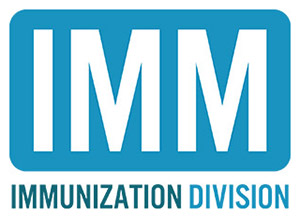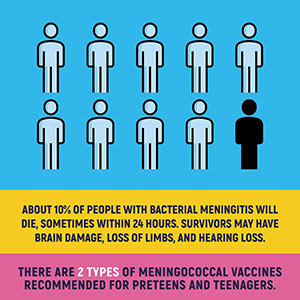
Immunization
Bureau of Communicable Disease
Font Size:
- Immunization Home
- ImmPRINT
- Immunization Quality Improvement for Providers (IQIP)
- Vaccines for Children Program
- Case Counts
- Measles Disease
- Outreach and Education
- Vaccine Information
- School Entry Survey
- Immunization Resources
- Alabama Adolescent And Adult Vaccination Task Force
- Data Requests
- Contact Us
Meningococcal Information
What's New
What is meningococcal disease?
- Meningococcal disease is any illness caused by the bacteria Neisseria meningitidis.
- It is the leading cause of bacterial meningitis in children 2-18 years of age in the U.S.
- Meningococcal disease can be very serious, even life-threatening in 48 hours or less.
- The two most severe and common illnesses caused by meningococcal bacteria include:
- Meningitis - an infection of the fluid and lining around the brain and spinal cord
- Septicemia - a bloodstream infection.
What are the symptoms?
- Symptoms of meningococcal disease are similar to influenza (flu) and may include:
- Sudden onset of a high fever
- Headache
- Stiff neck
- Nausea
- Vomiting
- Increased sensitivity to light
- Rash
- Confusion
- Severe aches and pain in the muscles, joints, chest, or belly
How does meningococcal disease spread?
- Meningococcal disease is spread person-to-person by sharing respiratory secretions, through kissing or coughing, close or lengthy contact, and among people who share a room or live in the same household.
- Anyone can get meningococcal disease, but teens and college freshmen who live in residence halls are at increased risk.
- Some people can "carry" meningococcal bacteria in their nose and throat without getting meningococcal disease, but can still infect other people.
- Most cases of meningococcal disease are spread by people who "carry" the bacteria with no symptoms, appear to be random, and not linked to other cases.
- Meningococcal oubreaks can occur in communities, schools, colleges, prisons, and in other high-risk populatons.

Meningococcal Vaccine
Who should get meningococcal vaccine?
- Meningococcal vaccine(s) is recommended for all preteens and teens.
- All 11 and 12 year olds should be vaccinated with serogroups A, C, W, and Y meningococcal conjugate vaccine (MCV4). A booster dose is recommended at age 16.
- Teens and young adults, 16 through 23 year olds, may also be vac
cinated with a serogroup B meningococcal vaccine (SBMV), preferably at 16 through 18 years old. - Both MCV4 and SBMV can be given at the same time, talk to your provider.
- Teens with HIV should get three doses of MCV4.
- People 55 years of age and older should get Meningococcal polysaccharide vaccine (MPSV4).
- People at increased risk (ex: no spleen or poor spleen, autoimmune disease) during an outbreak, should be vaccinated.
Who should be vaccinated because they are at increased risk?
- College freshmen living in dormitories.
- Laboratory personnel exposed to meningococcal bacteria.
- U.S. military recruits.
- Anyone traveling or living where meningococcal disease is common, like Africa.
- Anyone with a damaged spleen or who had the spleen removed.
- Anyone with an immune system disorder.
- Anyone exposed during a meningococcal meningitis outbreak.
What are the vaccine side effects and risks?
- MCV4 and SBMV are safe, but side effects can occur.
- Most side effects are mild or moderate and do not affect daily activities.
- The most common side effects in preteens and teens occur where the injection is given and may include pain, tenderness, swelling, and hardness of the skin.
- Other common side effects may include nausea, feeling a little run down, and headache.
- Some preteens and teens may also faint after getting a vaccine.
- Reactions usually last a short time and get better within a few days.
Where can I find more information?
- Ask you doctor or your local county heath department.
- Email the Alabama Department of Public Health Immunization Division at [email protected].
- Go to cdc.gov and type "meningococcal vaccine" in the SEARCH box.
- Read, print, and share our Meningococcal Fast Fact Flyer to learn more about pertussis disease and vaccines.
Page last updated: September 25, 2025




